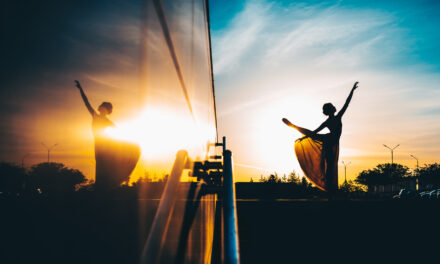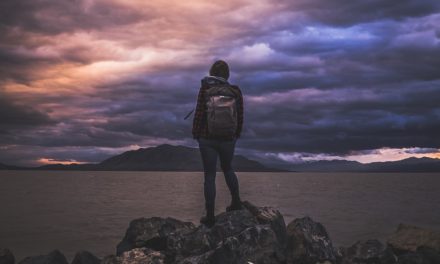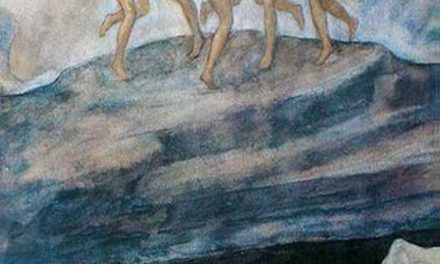Slowly I discover how my house is situated in the universe. Within its walls I sail through the cycle of seasons, an explorer with my neck strained forward. The first time the moon woke me bolt upright by appearing over the roof’s eaves and onto my pillow at four a.m., it was a brilliant surprise. Now the moon sags in the southern sky, skimming over my neighbor’s house where it can’t possibly reach my bedroom window. The planet is turning. Moonlight blankets the rooftops and enters the back door like a thief.
I’m awake now. I’m paying attention. In this new day, the house and I have arrived safely at winter. Snow is piled in blue-shadowed mounds along the walk, the sky is blazingly clear, and I’m paused at my window. A bird-feeder, which has hung from the porch eaves for months, today, for the first time, has been discovered by a squirrel. He hangs from the wire loop by his rear paws, feasting upside-down. Perhaps the two feet of snow on the ground has something to do with his sudden ingenuity. Certainly the snow and cold temperatures (six below today, the radio announcer tells me) have to do with the feast I’m indulging in, a day without commitments, hour after empty hour. Grand extravagance! I’ve found a windfall. I want to gorge until I stumble backward, stuffed with limitless time.
But I can’t. Somehow the capacity to inhabit time loosely, easily, moving from whim to whim until the day achieves its organic form, eludes me. I’m unable to work—do my chores, lesson plans, phone calls—with an unburdened calm and responsiveness. Instead, I sit down to write and the weight of a hundred tasks heaves into my brain. I make lists. The more practical tasks bully their way into my creative space and taunt my every sentence. That witticism performs wonders on your leaky basement. Wouldn’t a letter to your congressperson prove more effective than this literary whine? But if I brush away the million to-do’s and face emptiness, panic claws my chest. The day becomes voluminous and reeling. I fear that the creative drive, were I to submit fully, would consume me and render me an irresponsible citizen. Does my life have worth without productivity? I could write all day, or pray, and when my mortgage payment comes around those pages and prayers turn into so much dross. Time may be neutral, but some ways of spending it get valued over others until time itself feels moralistic and threatening. I don’t know how to unwrap time as the gift it is, free and simple and inviting, without it inevitably corroding through exposure to the inimical world.

From my writing window, I watch the neighborhood children make their way to school. There must be a patch of ice on the sidewalk across the street; elementary kids bundled in neon pink and green reach the spot and then move nowhere, despite their exaggerated walking motions. They bump into one another and fall, disappearing behind the pile of snow which lines the gutter. Later, the high school kids emerge wearing letter jackets and no hats. They amble down the sidewalk at a pace I doubt my body is capable of any longer, having been continually pressed into productive service over years. The kids are so carelessly slow, I hope they will survive the half-mile to school without freezing. I’m in awe. What is fearsome to me, to have all the time in the world, these kids take for granted. When I venture out for a walk this noon, I determine, I’m going to try going that slow. Is dawdling still within my repertoire?
I don’t remember keeping that kind of pace as a kid, but I’m sure I did. Every pair of shoes I owned was worn through at the heels from deliberate scuffing. What I do remember is one sixth grade afternoon, walking the five blocks from the bus stop. I was alone; my school bag was slung over my shoulder and I dragged my feet along the pavement. Ant hills erupted from cracks in the gutter.
Suddenly I stopped and stared at my feet. The distance from my head to my toes was astounding; I felt dizzy; I was sure I would fall. When did I get so tall? How would I ever survive the world from such an unrealistic height? Just as quickly the sensation was gone and my four-and-a-half foot body felt sensible again. But I was shaken up. At any moment my memory of being two years old might take over, and my physical self would seem monstrous. Or, I speculated, my fore-knowledge of being twenty would feel cramped in this eleven-year-old body. What was this within me that could mutate and shift? I moved forward again, heels scraping the cement. For the rest of the walk home I lived in the miraculous appropriateness of my body.
Each day is a body. I flesh out this one with the choices I make—to window-gaze, delight idly in language, then fling myself from the dishes to the laundry to the dust bunnies in repentance, chat with neighbors, run meetings at church, heave myself into bed. One moment balloons with volume and the next is constrained, limited, cut short. What if I grow listless or bored? What if I die tomorrow? What if I don’t die, but live so far into retirement that my life ends in poverty? Except for these immediate moments in front of the bird feeder, time, like God, is shapeless and unpredictable. If I walk in the body of tomorrow or yesterday, I topple over. Instead I must learn again how to drag my heels—how to not panic when I come to a patch of ice on the sidewalk, but rather thrust my weight forward, fling wide my arms, and glide.

It takes effort to dwell in time in ways other than the unthinking obvious. I first learned this when I was younger—ten, on a field trip with Mr. Lorde’s fifth grade class. We were crammed in a bus that at first smelled of fresh rubber mats and plastic seats, but gradually acquired the pervasive odor of strawberry bubble gum. The noise level reached a searing pitch before we pulled out of the school parking lot. Cynthia Robinson and I had been lucky; we sat together on the hump seat above the rear left wheel. Every time the bus hit a bump in the road, we went flying. The streets of Tarrytown were uneven and glorious.
Eventually we were careening smoothly down the highway. The bus noise had organized itself; the majority were singing “Ninety-nine Bottles of Beer on the Wall.” It was going to be a long drive.
“Do you know what I do when we take car trips?” Cynthia asked me. She was the only kid in our class with brilliant red hair and freckles. She played violin in the Morse School orchestra, and, unlike the rest of the orchestra, was good. For Halloween, she’d been Cleopatra with a wig of straight black yarn-hair. I’d been Pocahontas.
“What?” I was interested. My family took plenty of long car trips. I had my own secret game, but I’d never told anyone.
Cynthia reached over me to point out the window. “See that metal thing?” she asked. We both watched the guard rail race parallel to the highway, while shrubs and ditches and hillsides blurred in the background. “I imagine this little guy with red shoes and a red cap racing on top of it. He just runs and runs.”
I looked from Cynthia’s eyes out to the thin silver edge. “Doesn’t he get tired?” I asked. I imagined the poor fellow with such small legs trying to keep up with the bus.
“Nope.”
“What happens, like right there!” I pointed to a break in the guard rail as we went onto a bridge. There was a dangerous six feet of weeds before a low cement wall began. Below us, the bus tires made a high-pitched whine on the grooved pavement.
“He just jumps. He can jump really far.”
I saw him pumping his tiny arms, fearless of the distance beneath the bridge, the tassel of his cap flying behind him. When the bridge wall ended and the guard rail began again, he leaped effortlessly.
Yes, this was a good game.

“Do you want to know what I do?” I asked Cynthia hesitantly. It felt risky to share our private, imaginary worlds. At age ten, peers were becoming moody and unreliable. I was beginning to be cautious with secrets, especially my own, because I’d seen them turned against me. But in this moment, Cynthia seemed trustworthy, and eager.
She nodded.
“I make up stories. I say, ‘What would it be like if…, and I fill in the blank.”
“Like if people had wings?”
“Yeah, or if we could read each other’s minds, or if there were whole other worlds living right on top of our world, only in different dimensions. And then I pretend I’m living there, and make up what would happen.”
Cynthia considered this for a minute. “Hmm,” she said, finally. Her eyes grew distant; I could tell she was playing a scene out in her mind, trying on my game just as I had tried on hers. For a minute it was quiet between us, and then there was nothing—we were staring out the window, hypnotized by movement that always stayed the same. Our hearts grew still. The world narrowed itself down to that little runner who covered distance lightly or to the edge of unfolding in a what-if story, singular and present. In that silent place, time did not exist. Or if it did, it was a clean, concise moment big enough to sustain eternity. I know that we shared this experience, because when the bus stopped, it jolted us both. The noise of our classmates hit us like a wall, as though we had crossed back through the sound barrier. “We’re there already?” Cynthia exclaimed. It seemed like the bus had driven the entire length of a string, while Cynthia and I found a place where the string looped, its ends almost touching. We had leapt airily from one frayed end to the other.
And landed someplace new. A good meditation still does the same for me, hauling me out of the customary sensation of time into a non-quantifiable space pulsing with breath. The hours condense to a point. Often I rebel by avoiding meditation and its seeming lack of productivity. Or I strain against that black hole of quiet with my myriad monkey thoughts. Or, rarely, I let go. Is the world always so packed with eternity, and just our perceptions of it that are fleeting? Do I dwell in time or does time reside (caged, an eager animal) in me?
I hardly know what to think. Meanwhile, my culture cries, “Forward, march!” Time is linear, just like the accumulation of money market interest and the progression of public school curriculum and the growth of mold on my refrigerated leftovers. We climb out from the womb and run toward the grave. Time is clear—a clock, a calendar, a lifeline we draw in memoir class with significant moments ticked off in chronological order. We measure time in events and accomplishments. We don’t have time to think otherwise.

Recently a friend challenged me to write a musical score of my spiritual journey, knowing full well I’d never composed music. “If you can’t hear the melody, at least make it artistic, or rhythmic, or colorful.” I drew my score with crayon on staff paper, my whole notes a deep purple, the rests in black and white, the chords leaping into the margins in rapid succession. Time became less a progression of events and more a composition. To get from this moment in history to that moment in the future, I might walk forward doggedly, or I might slide down the decrescendo to the da capo, ending where I began. After all, it’s winter over and over again. The seasons aren’t moving anywhere fast.
In fact, we all have experienced time in its warped and limber form—in our dreams, those night-time ventures off the charted map. I learned this at a still younger age, when I was seven and my sister five and my mother first explained daylight savings time to us. It was fall, late on a Saturday night; we had just walked around the house turning the hands of our clocks back an hour, and then collapsed on my parents’ bed. Apparently the entire country was doing the same thing. Marcy and I were confounded. Time was still happening, wasn’t it? Who were we to tinker with the clocks?
My mother was exhausted. She lay on her back as though she had no intention of putting us to bed. “We don’t actually get an extra hour,” she explained with her eyes shut. Her speech was slurred with sleep. “We just measure time differently, so that the daylight is more in the middle of the day.” Marcy and I looked at each other, perplexed. “This way,” my mother said, the muscles of her face going slack, “little kids don’t have to walk to school in the morning with blue paint.”
For a moment Marcy and I puzzled over this latest mystery. Changing the clocks, the walk to the bus stop and blue paint? I pictured a nation’s worth of schoolchildren condemned to paint the morning skies because we had not messed with the mechanics of our clocks the evening before. Then we realized she’d fallen asleep and we burst with laughter. “What? What?!” my mother demanded, propping herself up on her elbows.
“You fell asleep!” we told her. “You said blue paint!” Those sloshing pails had appeared out of nowhere. In the middle of explaining daylight savings, my mother slipped into another time entirely, one which unravels in images rather than numbers, where fabulous leaps of logic and chronology still make a continuous story. There are no clocks to turn back in our dreams. There is no time whatsoever in dreams, but rather one event melted into the next, so that we wake with vague recollections of infinity.

No, time is not what we conceive it to be. Distance to the stars is measured in light years. Humanity is a blip in the history of the earth. What started as a day without obligations—an achingly blue sky—has stuffed itself with sentences. The squirrel leaps six feet from the feeder to the ground, landing heavily in the snow, and red-breasted house finches alight in his place. The school bus is gone. I could, if I wanted, walk around the block or knock icicles off the eaves or go back to bed. I could find a more profitable occupation, requiring my daily attendance and distracting me from fruitful leisure. Perhaps then I could get a new muffler for my car.
Instead, I carve out hours for prayer and writing. There’s so much time! Only rarely am I able to enter it as children do, bloating the hours the way air expands a tire. In the summer when I was little, my friends and I wheeled our bikes up to the top of Pokahoe hill and made odd rules for ourselves—only one push on the bike pedal, from the twelve o’clock position to six o’clock, and then no more pedaling! Whoever went furthest won. We sailed far too fast down Pokahoe’s slope, turned a sharp corner onto Hemlock, passed the bus-stop with its high tangle of bittersweet vines, passed Mrs. Kelly’s house where I took ballet lessons, slowing around the bend until we finally bottomed out in the horseshoe curve of Birch Close, our bikes crawling by the inch until we lost our balance. Time for us was the distance we covered. And those moments we sagged into the kitchen, complaining to my mother that we were bored, that there was nothing to do, were the times our hearts had shut down. We couldn’t bear the field of time extending forever, or to the beginning of school, neither of which we could imagine.
Adulthood is the opposite: so much to do that time gets crammed. Afraid of time’s immense cavern, we judge it—quality time, productive time, wasted time—then turn our backs on its ambivalent vastness. Whatever happened to that elementary school construct, “free time”? Why, when I face the emptiness of another morning, is my instinct to run as though from a fearsome God, to give my time away in the guise of earning a living, and then to pack the remainder with errands and the hundred tasks of keeping house? I’d become socially acceptable then, one of the many complaining that there’s not enough time. It’s easier that way, traveling down a life’s timeline, crossing off events like a to-do list—in other words, taming the beast as is our culture’s custom.
It’s much harder to take the time I’m given and inhabit its nuances. The postman lumbers up the walk, frightening off the finches; he slides the mail through the slot and it clatters into the little box. The sun is midway up the southern sky. Looking down my walkway, the heaps of snow on the left are golden and those on the right are blue-gray. I’ve often thought a day observing the exchange of light and shadow on my home’s walls would be well spent. Then I’d recognize which parts of this house face our mother star and which turn their back. The movement of the earth would reveal its quiet drama on the walls and floorboards. I’d witness a day, so simple, so long and full of splendor.
But I’ve never had the forbearance. Perhaps time is better known obliquely, anyhow. They say the soul is like that, a fickle thing, revealed not by a spotlight but in shadows. If I look at the length of this day through my peripheral vision, it’s neither short nor long, empty nor full; it has no expectations nor prerequisites nor regrets. Through its impartial and generous nature, time emanates holiness. Thus our relationship with time is telling—it exposes our gods. Right now, the sunlight hits the piano at an angle, smearing the propped-open music, singling out the lowest octave and four keys below middle C. The performer is a brilliant ghost. The music of this moment is different from the next (the sun shifts up a half-step), but each resounds with…silence, with continuity, with the passage of life. I can’t bear to watch the whole concerto, darkness overtaking the keyboard while sunlight climbs the walls. I’ll only catch glimpses. In a sideways glance, I see a shadow fly across the living room—a crow, possibly, winging its way to the back yard. I have no idea what time it is. But I suspect I’ve just seen the mechanics move inside the clock.

Only once do I ever remember looking time directly in the face.
When I was in college, a friend of mine had the key to the campus observatory. Throughout our senior year we took advantage of it—free access to one of the finest telescopes in Minnesota. Late at night, our walk from the library to the dorms took us past the squat brownstone with its silver dome curved against the heavens. If the stars were out, the dome glowed faintly. Marc and I would postpone our much-needed sleep, and instead climb the steps, push back the huge wooden door, and enter a playground of stars.
On the evening of graduation, the planets were in conspicuous alignment, Venus, Mars and Jupiter a perfect triangle within the scoop of a quarter moon. It was an auspicious sky, worth looking at more closely. After a dinner with two other friends and our families, Marc led us up the steps to the Goodhue Observatory. Moon and planets were bright enough to make the other stars blurry, but we didn’t mind. We wanted to see the planets’ countenance.
Immediately inside the front doors was the display room. It was round, with heavy oak cabinets encircling the base of the telescope upstairs. Glass doors to the cabinets looked in on dusty moon rocks and unremarkable meteor remnants. We mounted the creaky, narrow staircase at the back of the room, past professors’ doors plastered with comic strips, postcard photos of Einstein, and murals of the constellations, to the top landing, whose light fixture contained a red bulb. The eerie glow was like the entrance to a temple. Marc inserted his key in the door, and we stepped into the breezy dome of the observatory with its elongated and wondrous eye.
When Marc opened the hatch, we were half indoors and half out, with only a cracked metal shell separating us from the expanse of night. I loved how that rounded cavern had a wind of its own. Marc pressed a button and great rollers at the dome’s base began to turn, the aperture rotating toward the eastern sky. An eerie wail bounced off the rounded ceiling—the music of the spheres. We pointed the telescope upward and eastward, then took turns peering at Venus, ribbed and vibrant; the surface of the moon, pocked, textured with shadow. My grandmother stretched her sight upward, then my sister and parents, then each of my closest friends. When we spoke, it was in whispers whose sibilants skipped over the dome’s metal surface. In the center of the room at the telescope’s base was a wood-framed case with a single red bulb lighting the center. There, weights sank and gears whirled, keeping time with the stars’ movement so that the telescope wouldn’t get left behind.
We swung the scope around to the Pleiades, then to the Horsehead nebula in Orion’s belt. The four of us friends had graduated; we would move into the world to teach, to get married, to go to graduate school; we would settle great distances from one another. Time would transport us into adulthood, with its preoccupations and accomplishments. But for now, we had converged in miraculous alignment. The light from those stars had traveled millions of years to arrive within our contraption of lenses. But it wasn’t the past that we were seeing, pulsing and brilliant. It was the present, resonant with a shared history and the tug of what lay ahead. Time and space were conjoined within the eye of a telescope, through which the people we loved were gazing. Now was all that mattered—all, indeed, that would ever exist. Our home in the universe was these curved, metal walls, arched against the sky. The dome swung around with its high-pitched song. Inside the telescope’s pedestal, the observatory’s heart beat the pulse of eternity.
All images by Finnish artist Anni Roenkae







I enjoyed reading your memoir, Swinging on the Garden Gate some years ago.
Good to see you in print again.
Marijo, thanks so much for reading both SWINGING and this. Fun to intersect with you!